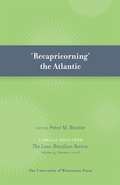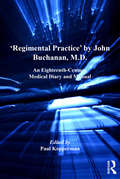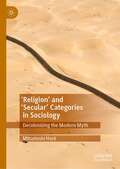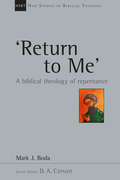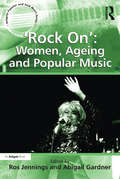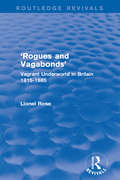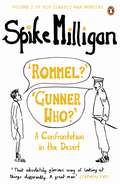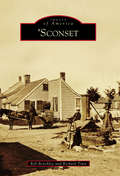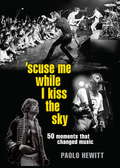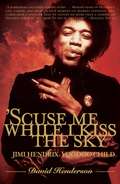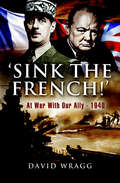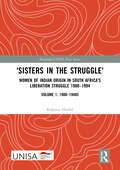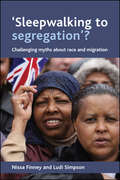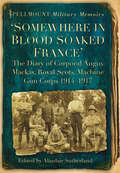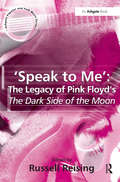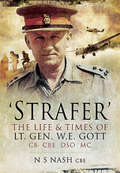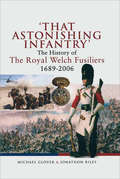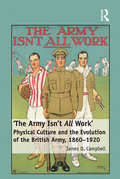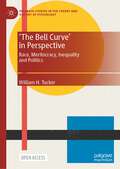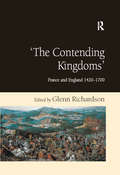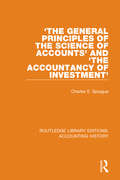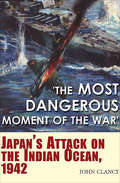- Table View
- List View
'ReCapricorning' the Atlantic: Special Issue of Luso-Brazilian Review 45:1
by Peter M. BeattieThis special issue of Luso-Brazilian Review includes articles on the Lusophone South Atlantic by historians of Africa and Brazil originally presented in May of 2006 at the Michigan State University and University of Michigan’s Atlantic History Workshop “ReCapricorning the Atlantic: Luso-Brazilian and Luso-African Perspectives on the Atlantic World.” Workshop participants set out to “ReCapricorn the Atlantic” by assessing how new research on the Lusophone South Atlantic modifies, challenges, or confirms major trends and paradigms in the expanding scholarship on Atlantic History.
'Regimental Practice' by John Buchanan, M.D.: An Eighteenth-Century Medical Diary and Manual
by Paul KoppermanIn 1746, Dr John Buchanan, recently retired as a medical officer in the British Army, produced a manuscript entitled, 'Regimental Practice, or a Short History of Diseases common to His Majesties own Royal Regiment of Horse Guards when abroad (Commonly called the Blews).' Revised in several stages almost until the time of Buchanan's death in 1767, this work was for the most part based on the author's observations while surgeon to a cavalry regiment serving in Flanders 1742-45, during the War of the Austrian Succession. It is a work of immense value to the understanding of eighteenth-century interpretation and treatment of diseases, but as yet has never been published. Presented here is an annotated modern edition of the text, with an introductory section setting the work in the context of Buchanan's life and career, and within the broader framework of eighteenth-century medical practice. Buchanan's practice of medicine generally represented the mainstream of professional practice as regarded both his understanding of disease and his treatment of it. Across the decades of the eighteenth century there were discoveries and fashions that impacted both the theory and the practice of medicine. Various writers of that age, as well as a number of historians since, have conveyed the sense that practice was chaotic. On the contrary, what this book argues is that methods used to treat diseases were fairly standard. Therefore, by reading Buchanan's manuscript one sees not only how he treated more than three dozen diseases, as well as various wounds and injuries, but also how these conditions were often treated in this period.
'Religion’ and ‘Secular’ Categories in Sociology: Decolonizing the Modern Myth
by Mitsutoshi HoriiInformed by ‘critical religion’ perspective in Religious Studies and postcolonial self-reflection in Sociology, this book interrogates the ideas of ‘religion’ and ‘the secular’ in social theory and Sociology. It argues that as long as social theory and sociological discourse embed the religion-secular distinction and locate themselves on the ‘secular’ side of the binary, Sociology will continue to serve the very ideologies it tries to subvert – namely Western modernity/coloniality.
'Return To Me': A Biblical Theology of Repentance (New Studies in Biblical Theology #35)
by Mark J. Boda"Return to me, says the LORD of hosts, and I will return to you," (Zech 1:3 ESV). Repentance concerns the repair of a relationship with God disrupted by human sin. All the major phases of church history have seen diversity and controversy over the doctrine. The first of Luther?s famous ninety-five theses nailed to the church door in Wittenburg in 1517 stated that 'the entire life of believers should be one of repentance'. In recent times, two divisive debates within evangelicalism over 'lordship salvation" and "hypergrace" have had repentance at their core. The theme of repentance is evident in almost every Old and New Testament corpus. However, it has received little sustained attention over the past half-century of scholarship, which has been largely restricted to word studies or focused on a particular text or genre. Studies of the overall theology of the Bible have typically given the theme only passing mention. In response, Mark Boda offers a comprehensive overview of the theological witness of Scripture to the theme of repentance in this New Studies in Biblical Theology volume. The key to understanding is not simply to be found in word studies, but also in the broader meaning of texts as these communicate through a variety of words, images and stories. The importance of repentance in redemptive history is emphasized. It is fundamentally a return to intimate fellowship with the triune God, our Creator and redeemer. This relational return arises from the human heart and impacts attitudes, words and actions. Addressing key issues in biblical theology, the works comprising New Studies in Biblical Theology are creative attempts to help Christians better understand their Bibles. The NSBT series is edited by D. A. Carson, aiming to simultaneously instruct and to edify, to interact with current scholarship and to point the way ahead.
'Rock On': Women, Ageing and Popular Music (Ashgate Popular and Folk Music Series)
by Abigail GardnerFor female pop stars, whose star bodies and star performances are undisputedly the objects of a sexualized external gaze, the process of ageing in public poses particular challenges. Taking a broadly feminist perspective, 'Rock On': women, ageing and popular music shifts popular music studies in a new direction. Focussing on British, American and Latina women performers and ageing, the collection investigates the cultural work performed by artists such as Shirley Bassey, Petula Clark, Madonna, Celia Cruz, Grace Jones and Courtney Love. The study crosses generations of performers and audiences enabling an examination of changing socio-historical contexts and an exploration of the relationships at play between performance strategies, star persona and the popular music press. For instance, the strategies employed by Madonna and Grace Jones to engage with the processes and issues related to public ageing are not the same as those employed by Courtney Love or Celia Cruz. The essays in this insightful collection reflect on the ways that artists and fans destabilise both the linear trajectories and the compelling weight of expectations regarding ageing by employing different modalities of resistance through persona re-invention, nostalgia, postmodern intertextuality and even early death as the ultimate denial of age.
'Rogues and Vagabonds': Vagrant Underworld in Britain 1815-1985 (Routledge Revivals)
by Lionel RoseIn this lively social history, first published in 1988, Lionel Rose explores in detail the plight of the street poor between 1815 and 1985. He describes the Victorian ‘Rogues and Vagabonds’ who made elicit peddling, begging frauds and other petty crime their profession. He considers the relevant legislation and systems for coping with the street poor, from the 1824 Vagrancy Act and accompanying improvements in policing, through the casual ward systems of the workhouses and the role of common lodging houses, to the development of Social Services in the 1940s and local authority provision of accommodation. This title will be of interest to students of history, criminology and sociology.
'Rommel?' 'Gunner Who?': A Confrontation in the Desert (Spike Milligan War Memoirs)
by Spike MilliganVOLUME TWO OF SPIKE MILLIGAN'S LEGENDARY MEMOIRS IS A HILARIOUS, SUBVERSIVE FIRST-HAND ACCOUNT OF WW2'Brilliant verbal pyrotechnics, throwaway lines and marvelous anecdotes' Daily Mail 'Desperately funny, vivid, vulgar' Sunday Times ______________'Keep talking, Milligan. I think I can get you out on Mental Grounds.' 'That's how I got in, sir.' 'Didn't we all.' The second volume of Spike Milligan's legendary recollections of life as a gunner in World War Two sees our hero into battle in North Africa - eventually. First, there is important preparation to be done: extensive periods of loitering ('We had been standing by vehicles for an hour and nothing had happened, but it happened frequently'), psychological toughening ('If a man dies when you hang him, keep hanging him until he gets used to it') and living dangerously ('no underwear!'). At last the battle for Tunis is upon them . . .______________'The most irreverent, hilarious book about the war that I have ever read' Sunday Express 'Milligan is the Great God to all of us' John Cleese 'The Godfather of Alternative Comedy' Eddie Izzard 'A totally original comedy writer' Michael Palin 'Close in stature to Lewis Carroll and Edward Lear in his command of the profound art of nonsense' Guardian
'Sconset (Images of America)
by Rob Benchley Richard Trust'Sconset, the popularized version of its official name Siasconset, prides itself on preserving the charm and rich, historical character of the quaint, little village in the southeastern corner of Nantucket Island. Acclaimed as one of America's first summer vacation retreats, 'Sconset is cherished for its rose-covered cottages, lush hydrangeas, quiet paths and lanes, three miles of soft-sand beach, its iconic Sankaty Head Lighthouse, and a host of seasonal amenities. Siasconset is a Wampanoag Algonquian word meaning "place of great bones." Seven miles from bustling Nantucket town, 'Sconset was a remote fishing station of the Wampanoag when they first met with Europeans in 1659. Today, 'Sconseters embrace a strong sense of community with more than 2,000 summer residents but only about 200 hardy souls living there year-round.
'Scuse Me While I Kiss the Sky: 50 Moments That Changed Music
by Paolo HewittFrom the moment that Ike Turner and the Kings of Rhythm conceived 'Rocket 88' to the suicide of Nirvana lead singer Kurt Cobain and Lennon's Anniversary concert, 'Scuse Me While I Kiss the Sky chronicles 50 moments in history that shaped rock and roll as we know it. The stories of behind the iconic records and recordings, the untimely deaths, landmark live performances, on-screen incidents and all of the most outrageous moments are recounted in this captivating, comprehensive overview of the greatest musical form of the twentieth century. Paolo Hewitt's lively and readable text gives us a unique 'insider's view' on each event explaining the background and immediate aftermath to the moment as well as its long term significance and legacy. Each story is accompanied by an 'at a glance' box about each artist, their most significant achievements and contribution to rock history. Iconic moments include: First show of the Beatles at the Cavern; First show of the Rolling Stones at Eel Pie Island; Dylan goes electric at the Newport Folk festival; The Beach Boys' 'Good Vibrations' is the first pop hit to employ electronic sounds; The Ramones debut at the CBGB's and launch punk-rock; The Sex Pistols singer Johnny Rotten is attacked in a car park by a razor-wielding man incensed by the band's anti royalty single, God Save The Queen; The Clash's 'London Calling' mixes punk-rock with reggae, ska, funk, blues, etc; The Talking Heads' Fear Of Music, produced by Brian Eno, fuses new wave and funk, and invents 'techno-funk'; Sid Vicious and Nancy Spungen die at the Chelsea hotel; Ozzy Osborne bites the head off a bat and urinates on the Alamo; MTV debuts on cable TV with the Buggles' 'Video Killed The Radio Star'; Born In the USA is appropriated by Ronald Reagan for his election campaign; Live Aid concert; The Smiths release their infamous Meat Is Murder album; Kurt Cobain dies; Anniversary concert for Lennon at the Beacon theatre in New York 2010.
'Scuse Me While I Kiss the Sky: 50 Moments That Changed Music
by Paolo HewittFrom the moment that Ike Turner and the Kings of Rhythm conceived 'Rocket 88' to the suicide of Nirvana lead singer Kurt Cobain and Lennon's Anniversary concert, 'Scuse Me While I Kiss the Sky chronicles 50 moments in history that shaped rock and roll as we know it. The stories of behind the iconic records and recordings, the untimely deaths, landmark live performances, on-screen incidents and all of the most outrageous moments are recounted in this captivating, comprehensive overview of the greatest musical form of the twentieth century. Paolo Hewitt's lively and readable text gives us a unique 'insider's view' on each event explaining the background and immediate aftermath to the moment as well as its long term significance and legacy. Each story is accompanied by an 'at a glance' box about each artist, their most significant achievements and contribution to rock history. Iconic moments include: First show of the Beatles at the Cavern; First show of the Rolling Stones at Eel Pie Island; Dylan goes electric at the Newport Folk festival; The Beach Boys' 'Good Vibrations' is the first pop hit to employ electronic sounds; The Ramones debut at the CBGB's and launch punk-rock; The Sex Pistols singer Johnny Rotten is attacked in a car park by a razor-wielding man incensed by the band's anti royalty single, God Save The Queen; The Clash's 'London Calling' mixes punk-rock with reggae, ska, funk, blues, etc; The Talking Heads' Fear Of Music, produced by Brian Eno, fuses new wave and funk, and invents 'techno-funk'; Sid Vicious and Nancy Spungen die at the Chelsea hotel; Ozzy Osborne bites the head off a bat and urinates on the Alamo; MTV debuts on cable TV with the Buggles' 'Video Killed The Radio Star'; Born In the USA is appropriated by Ronald Reagan for his election campaign; Live Aid concert; The Smiths release their infamous Meat Is Murder album; Kurt Cobain dies; Anniversary concert for Lennon at the Beacon theatre in New York 2010.
'Scuse Me While I Kiss the Sky: Jimi Hendrix, Voodoo Child
by David HendersonDavid Henderson's biography of Jimi Hendrix, Jimi Hendrix: Voodoo Child of the Aquarian Age -- first published in hardcover in 1978 -- was described by Greil Marcus of Rolling Stone as "[t]he strongest and most ambitious biography yet written about any rock and roll performer."
'Sighted Souls' and Other Stage and Radio Plays
by Bs MurthyA compendium of the author's stage and radio plays: "Slighted Souls" is a poignant love story set in rural Telangana, beset with feudal exploitation of the downtrodden dalits. Besides forcing the dalits to toil in the fields as bonded labor without impunity, the land owning doras had no qualms in reducing the womenfolk of this ilk as sex slaves in the gadis, which results in an armed rebellion engulfing two young lovers. "Men at work on Women at work" is a tragic-comic episode depicting the fallout of sexual harassment at the workplace in the Indian urban setting with its traditional cultural underpinnings. "Castle of Despair", built on the slippery ground of man's innate urge for one-upmanship, portrays its facade of falsity on the grand stage of human tragedy. The radio play, "Love on Hold", lends voice to the felt anxieties of a man and a woman as their old flame gets rekindled felt and the dilemmas of possession faced by the couple in a conservative cultural background.
'Sink the French!': At War with Our Ally—1940
by David WraggA history-defining moment in World War II, when the allied nations of England and France stood on the precipice of betrayal—and war with each other. After the forces of Nazi Germany launched their Blitzkrieg assault on Holland, Belgium, and Northern France, the tentative relationship between Great Britain and France was strained to the limit. For when the Vichy regime surrendered, the British had grave fears that the Germans would force the French naval fleet—the fourth largest in the world—to turn against their former ally, while in fact their orders were to scuttle should the Germans attempt to seize them. ‘Sink the French!’ examines the precursors to the fall of France and its consequences, most particularly the way the French Navy was dealt with. It examines the confused situation that France’s defeat created, including the rise of a relatively junior French general, Charles de Gaulle, who was smuggled out of France by the RAF. Elsewhere French ships were boarded and seized by the British, and at Oran, Algeria, their fleet was bombarded by the Royal Navy—just as there were other incidents including French aircraft bombing Gibraltar. This insightful exploration of a world sinking into chaos—and the mistrust war can breed between allies—is a must-read for anyone interested in this pivotal moment in history, when opposition to the Nazis was almost broken.
'Sisters in the Struggle': Women of Indian Origin in South Africa's Liberation Struggle 1900–1994 (VOLUME 1: 1900–1940s) (Routledge/UNISA Press Series)
by Kalpana Hiralal‘Sisters in the struggle’: Women of Indian Origin in South Africa’s Liberation Struggle 1900–1994 unveils an unchartered historical terrain, highlighting the contributions of Indian women towards non-racialism and equality and their experiences within diverse political parties; therefore, shifting the post-apartheid liberation stories which have been dominated by the journey of the ANC to other political organisations who collectively played a significant role in South Africa’s road to democracy. In this book, Hiralal presents a refreshing perspective of Indians, particularly women, as contributors and activists in the struggle. The book elucidates that the struggle against apartheid was a collective endeavour among the oppressed races and not a one-sided endeavour by the ANC. The book, thus, examines the participation of Indian women against apartheid and colonialism within gendered and political frameworks.
'Sleepwalking to segregation'?: Challenging myths about race and migration
by Nissa Finney Ludi SimpsonIn the context of renewed debates about diversity and cohesion, this book interrogates contemporary claims about race and migration. It demonstrates that many of the claims are myths, presenting evidence in support of and in opposition to them in an accessible yet academically rigorous manner. The book combines an easy-to-read overview of the subject with innovative new research. It tackles head-on questions about levels of immigration, the contribution of immigrants, minority self-segregation, ghettoisation and the future diversity of the population. The authors argue that the myths of race and migration are the real threat to an integrated society and recommend that focus should return to problems of inequality and prejudice.
'Somewhere in Blood Soaked France': The Diary of Corporal Angus Mackay, Royal Scots, Machine Gun Corps, 1914-1917 (Spellmount Military Memoirs)
by Alasdair SutherlandFrom the heat and dust of the Dardanelles to the mud of the Western Front, Corporal Angus Mackay had one constant companion, his diary. He wrote of the battles and campaigns he fought in, names that would go down in history: Gallipoli, the Somme, Ypres and Arras. Serving in the the 1st/5th Battalion (Queens Edinburgh Rifles) Royal Scots and later the 88th Brigade Machine Gun Corps, he left a record of one man's extraordinary and tragic war. In Somewhere in Blood Soaked France, Alasdair Sutherland reveals this previously unpublished account of the First World War, complete with historical context, orders of battle and extracts from official war diaries. This rare source - it was an offence to keep a record in a case of capture - offers a stirring insight into the bravery of Mackay and his companions, who were not afraid to die for their country. 'If I go under it will be in a good cause, so roll on the adventure.'
'Speak to Me': The Legacy of Pink Floyd's The Dark Side of the Moon
by Russell ReisingThe endurance of Pink Floyd's The Dark Side of the Moon on the Billboard Top 100 Chart is legendary, and its continuing sales and ongoing radio airplay ensure its inclusion on almost every conceivable list of rock's greatest albums. This collection of essays provides indispensable studies of the monumental 1973 album from a variety of musical, cultural, literary and social perspectives. The development and change of the songs is considered closely, from the earliest recordings through to the live, filmed performance at London's Earls Court in 1994. The band became almost synonymous with audio-visual innovations, and the performances of the album at live shows were spectacular moments of mass-culture although Roger Waters himself spoke out against such mass spectacles. The band's stage performances of the album serve to illustrate the multifaceted and complicated relationship between modern culture and technology. The album is therefore placed within the context of developments in late 1960s/early 1970s popular music, with particular focus on the use of a variety of segues between tracks which give the album a multidimensional unity that is lacking in Pink Floyd's later concept albums. Beginning with 'Breathe' and culminating in 'Eclipse', a tonal and motivic coherence unifies the structure of this modern song cycle. The album is also considered in the light of modern day 'tribute' bands, with a discussion of the social groups who have the strongest response to the music being elaborated alongside the status of mediated representations and their relation to the 'real' Pink Floyd.
'Strafer': The Life & Killing of Lt. Gen. W.E. Gott CB CBE DSO MC
by N. S. NashUnexpectedly selected by Churchill to command 8th Army in 1942 in place of the sacked Auchinleck, 'Strafer' Gott was targeted by German intelligence as he flew to Cairo to take up his new post. Six ME109s intercepted his aircraft and, after shooting it down, deliberately machine-gunned the crash scene. Gott became the only Allied general to be successfully targeted by the Germans and, as a result, Montgomery was given command and the rest is history.But as this long overdue and well researched biography reveals, 'Strafer' deserves to be remembered for his exceptionaltalents, meteoric career and record of gallantry. As a young officer in The Great War he won the Military Cross (many thought a VC would have been more appropriate) and he repeatedly attempted to escape. In 1939 he was commanding his Battalion as a Lieutenant Colonel and two years later he became a Lieutenant General. He was recognised as a superb Desert General whose aggression, originality and leadership qualities were supported by charm, warmth and compassion.While it is fascinating, if unproductive, to surmise what would have happened had Gott and not Monty fought Rommel, it can be confidently said that relations with our allies would have benefitted.Drawing on primary source material, this first biography of an outstanding soldier and commander is not only a rewarding and revealing read but an important addition to the bibliography of the Second World War.As featured in the Dover Express, Ashford Herald and Folkestone Herald.
'That Astonishing Infantry': The History of The Royal Welch Fusiliers, 1689–2006
by Michael Glover Jonathon RileyThe Royal Welch Fusiliers were present at all Marlborough's great victories; they were one of the six Minden regiments; they fought throughout the Peninsula and were present at Wellington's final glorious victory at Waterloo. In The Great War their officers included the writer poets Siegfried Sassoon and Robert Graves; their 22 battalions fought not just on the Western Front but at Gallipoli, in Egypt, Palestine, Salonika, Mesopotamia and Italy. In WW2 they won battle honours from the Reichswald to Kohima. More recently they have served with distinction in the war against terror in the Middle East. Like so many famous regiments the RWF are no longer in the British Army's order of battle having been amalgamated into the Royal Regiment of Wales. But this fine book is the lasting memorial to a fiercely proud and greatly admired regiment.
'The Army Isn't All Work': Physical Culture and the Evolution of the British Army, 1860–1920
by James D. CampbellBetween the Crimean War and the end of the First World War the British Army underwent a dramatic change from being an anachronistic and frequently ineffective organization to being perhaps the most professional and highly trained army in the world. Historians have tended to view that transformation through the successive political reform efforts of those years, but have largely overlooked the ways in which the Army transformed itself from within. This change was effected through the modernization of training, operational and leadership doctrines. The adoption of formal physical training and organized games played a central part in this process. With its origins in elite public schools and upper-class country homes, the Army's philosophy of Athleticism was a part of the ethos of 'muscular Christianity' widely held in contemporary British institutions. Under the potent influence of this philosophy, military sport went from a means of keeping soldiers from drink and the officers from duty, to an institutionalized form of combat training. This book documents the origins and development of formal physical training in the late Victorian Army and the ways in which the Army's gymnastic training evolved into a vital building block of the process of turning a civilian into a fighting man. It also assesses the nature and extent of British military sport, particularly regimental sports, during this period of evolution for the Army. Through an investigation of the Army's physical culture during this dynamic period, one can gain an understanding of not only how the Army's change from within occurred, but also of some of the important links between the Army and its parent society.
'The Bell Curve' in Perspective: Race, Meritocracy, Inequality and Politics (Palgrave Studies in the Theory and History of Psychology)
by William H. TuckerThis open access book examines the implications of The Bell Curve for the social, economic, and political developments of the early 21st century. Following a review of the reception of The Bell Curve and its place in the campaign to end affirmative action, Professor Tucker analyses Herrnstein’s concept of the “meritocracy” in relation to earlier 20th century eugenics and the dramatic increase in economic inequality over the past 30 years. Tucker demonstrates how, contrary to The Bell Curve’s predictions, the reallocation of these huge sums was neither rational nor beneficial for society. The book moves on to situate The Bell Curve within contemporary politics and shows how it can be seen to have played a role in the 2016 US election. This compelling analysis will appeal to scholars and those with an interest in the history of scientific racism, the history of psychology and the sociology of knowledge and science.This is an open access book.
'The Contending Kingdoms': France and England 1420–1700
by Glenn RichardsonThe kingdoms of France and England were for many centuries military, economic, cultural and colonial rivals. This is particularly true of the early modern period which witnessed the rise of French military hegemony and the expansion of English commerce. Dealing with the period 1420-1700, this collection offers a snapshot of Anglo-French relations across the three centuries from established historians and younger scholars from France, Britain and Luxembourg. Based broadly on 'diplomatic' history, but incorporating wider perspectives from cultural and social or gender history; each essay uncovers the fascinating and complex arrangements that characterize Anglo-French relations in this period. Competition and hostility between the two kingdoms there certainly was, but it took a surprising variety of forms and often proved intellectually productive for one side or the other and sometimes for both. The chapters mix treatments of broad themes and particular circumstances or individuals and each makes specific comparisons with French and English experience across the early-modern period. In so doing they elaborate and go beyond the evidence of Anglo-French hostility to explore evidence of political co-operation and cultural influences, highlighting just how close early modern England's connections with France were, even at times of crisis.
'The Damned Fraternitie': Constructing Gypsy Identity in Early Modern England, 1500–1700
by Frances Timbers'The Damned Fraternitie': Constructing Gypsy Identity in Early Modern England, 1500–1700 examines the construction of gypsy identity in England between the early sixteenth century and the end of the seventeenth century. Drawing upon previous historiography, a wealth of printed primary sources (including government documents, pamphlets, rogue literature, and plays), and archival material (quarter sessions and assize cases, parish records and constables's accounts), the book argues that the construction of gypsy identity was part of a wider discourse concerning the increasing vagabond population, and was further informed by the religious reformations and political insecurities of the time. The developing narrative of a fraternity of dangerous vagrants resulted in the gypsy population being designated as a special category of rogues and vagabonds by both the state and popular culture. The alleged Egyptian origin of the group and the practice of fortune-telling by palmistry contributed elements of the exotic, which contributed to the concept of the mysterious alien. However, as this book reveals, a close examination of the first gypsies that are known by name shows that they were more likely Scottish and English vagrants, employing the ambiguous and mysterious reputation of the newly emerging category of gypsy. This challenges the theory that sixteenth-century gypsies were migrants from India and/or early predecessors to the later Roma population, as proposed by nineteenth-century gypsiologists. The book argues that the fluid identity of gypsies, whose origins and ethnicity were (and still are) ambiguous, allowed for the group to become a prime candidate for the 'other', thus a useful tool for reinforcing the parameters of orthodox social behaviour.
'The General Principles of the Science of Accounts' and 'The Accountancy of Investment' (Routledge Library Editions: Accounting History #26)
by Charles E. SpragueThis book, first published in 1984, reprints the important texts The General Principles of the Science of Accounts (1901) and The Accountancy of Investment (1904) in one single volume. Charles Sprague pioneered the development of accounting theory in the United States, and his work is key in the study of the history of accounting and its development.
'The Most Dangerous Moment of the War': Japan's Attack on the Indian Ocean, 1942
by John Clancy“A well-detailed account of the [World War II] raid, which badly stung the Royal Navy but which the Japanese failed to exploit to a strategic advantage” (Seapower).In early April 1942, a little-known episode of World War II took place. Said by Sir Winston Churchill to be “the most dangerous moment of the war,” the Japanese made their only major offensive westwards into the Indian Ocean. As historian Sir Arthur Bryant said, “A Japanese naval victory in April 1942 would have given Japan total control of the Indian Ocean, isolated the Middle East and brought down the Churchill government.”Having crippled the American fleet at Pearl Harbor, the Japanese turned their sights on the British Eastern Fleet based at Ceylon. Occupation of Ceylon, now Sri Lanka, would not only provide the Japanese a springboard into India but also control of the essential convoy routes to Europe and the Western Desert. And aside from the British Eastern Fleet, the Indian Ocean lay undefended.In April 1942, a Japanese fleet led by six aircraft carriers, four battleships, and thirty other ships sailed into the Bay of Bengal. In the ferocious battles that followed, the British lost a carrier, two heavy cruisers, and many other ships; however, the Japanese eventually turned back, never to sail against India again. John Clancy, whose father survived the sinking of HMS Cornwall during the battle, “masterfully combines the strategic overview, the tactical decision making and many personal experiences to bring this episode of the war to life” (WWII Today).“Absolutely enthralling.” —Books Monthly“Well researched . . . a balanced view of men acting under the stress of war during a critical time.” —WWII History
